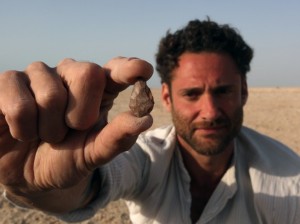This user has not added any information to their profile yet.
 My research endeavors to contextualize the role of the Saharo-Arabian arid belt in biological and cultural evolution. Over the course of human prehistory, the arid belt spanning North Africa, Arabia, and the Indian subcontinent experienced substantial environmental transformations. Pluvial episodes are known to have facilitated the expansion of flora and fauna from Africa into Arabia. Conversely, episodes of hyperaridity caused widespread desiccation, increased population pressure, and, eventually, the contraction of hominid groups into isolated environmental refugia. This model serves as the theoretical basis for my work, which evaluates the extent to which hominid dispersals are biogeographic processes linked to fluctuating climatic conditions, versus punctuated ‘events’ driven by biological change and/or cultural innovation.
My research endeavors to contextualize the role of the Saharo-Arabian arid belt in biological and cultural evolution. Over the course of human prehistory, the arid belt spanning North Africa, Arabia, and the Indian subcontinent experienced substantial environmental transformations. Pluvial episodes are known to have facilitated the expansion of flora and fauna from Africa into Arabia. Conversely, episodes of hyperaridity caused widespread desiccation, increased population pressure, and, eventually, the contraction of hominid groups into isolated environmental refugia. This model serves as the theoretical basis for my work, which evaluates the extent to which hominid dispersals are biogeographic processes linked to fluctuating climatic conditions, versus punctuated ‘events’ driven by biological change and/or cultural innovation.
For the past decade, I have directed the Dhofar Archaeological Project (DAP), an ongoing research program in southern Oman. My work addresses an array of topics such as the peoplings of Arabia, the emergence of pastoralism, genetic structure of Modern South Arabian language speakers, and modeling climate change over the course of the Pleistocene and Holocene. Since 2002, DAP has mapped over 700 new archaeological sites across southern Oman, representing nearly one million years of human history. We have collected several hundred lithic assemblages from all time periods, which will require decades of analysis. Among the most significant of these archaeological discoveries is the Dhofar Nubian Complex – a lithic technocomplex associated with the first modern humans to leave Africa.
In collaboration with geneticists from the College of Medicine at Sultan Qaboos University in Oman and the Academy of Sciences in the Czech Republic, we have begun to examine the mitochondrial structure of indigenous groups in Arabia. Our team has identified an unexpectedly high frequency of lactase persistence allele -13915*G in Dhofar, suggesting an independent process of cattle domestication rooted in southern Arabia. These archaeological and genetic findings are but the tip of the iceberg, and undoubtedly future research in Arabia - both on land and underwater - will continue to rewrite human prehistory.
Learn more about Jeff's research at:
National Geographic Explorer: http://www.nationalgeographic.com/explorers/bios/jeffrey-rose
Academia.edu: http://nationalgeographic.academia.edu/JeffreyRose
LinkedIn: http://www.linkedin.com/pub/jeffrey-rose/37/741/68
Contact Jeff at jeffrey.rose@ronininstitute.org

